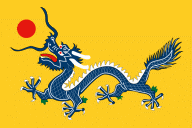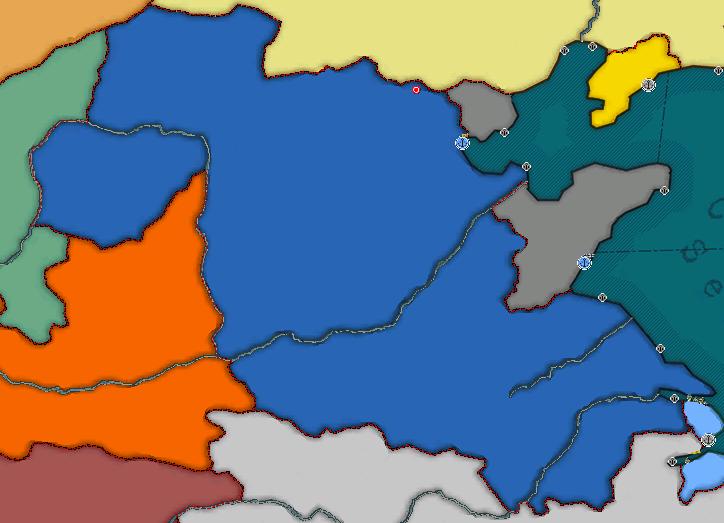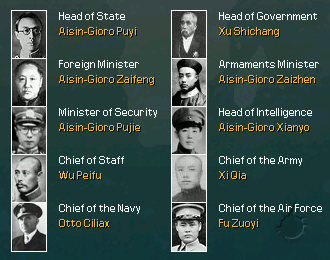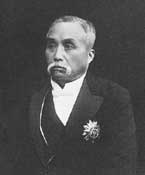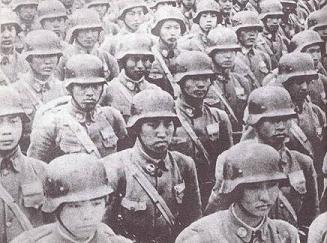Qing Empire
From Kaiserreich
| ||||
| Anthem Gong Jin'ou | ||||
| Official Language | Chinese | |||
| Capital | Beijing | |||
| Emperor | Pu Yi (era name: Xuantong) | |||
| Prime Minister of the Imperial Council | Xu Shichang | |||
|
| ||||
| Establishment - Establishment of the Qing Empire | 1616 | |||
| Re-Establishment - German restoration of the Qing Empire | February, 2 1927 | |||
| Government | Autocratic monarchy | |||
| Currency | Yuan | |||
| Area | circa 312,685 km² | |||
| Population | circa 65,700,900 | |||
The Empire of China, or officially Empire of the Great Qing (Pinyin: 大清國), or better known as Qing China (to distinguish it from the other factions in China) is a country in Eastern Asia. It is bordered to the north by Mongolia, the Fengtien Republic (under Japanese control), and the German enclave of Tangshan; to the east by German Shandong and the Yellow Sea; to the south by the Legation Cities and the Allgemeine Ostasiatische Gesellschaft; and to the west by the Shangqing Tianguo-controlled area and the Xibei Lianbang Yiyuan warlords' demesne.
The Qing Dynasty of Manchurian origin ruled the Empire of China from 1644, date of the conquest of Chian proper by the Manchu Aisin-Goro clan, to 1911, year of the Republican Xinhai Revolution that deposed Emperor Pu Yi. The Qing era coincided for China with the highly representative reigns of Kangxi and Cixi, but also with an increased isolation of China and the rise of European colonialism, reaching his peak with the Boxer Rebellion. After the 1911 Revolution, the Chinese Republic soon collapsed into anarchy, where power was divided between numerous warlords, until the 1926 German intervention. On February, 2 1927 (beginning of the Fire Rabbit Year), the Qing Empire was restored under the present system: an autocratic monarchy of divine right, centered on the Emperor's person and his orders transmission through a small Imperial Council. Even though the Empire of China stands as the only official power in China, it's still the shadow of its former self: much of the economic and military powers are monopolized by the Allgemeine Ostasiatische Gesellschaft, and puritan revolts is spreading in Chinese campaigns.
Contents |
History
Fall of the early Qing Empire
On the death of the Emperor Guangxu and his aunt Empress Dowager Cixi on November 1908, China was already about to collapse. The despotic and corrupted rule of Empress Dowager Cixi, beginning after the bloodbaths of the Opium Wars and the Taiping Rebellion, froze any chance of reforms and let the European powers and Japan dismembering with impunity the Middle Kingdom and intervening freely in its internal policy, as during the 1901 intervention against the Boxer Rebellion. After the death of the Emperor, his three-years-old nephew Pu Yi succeeded him, with the regency ensured by his father, Zaifeng, the 2nd Prince Chun. The regent tried to enhance reforms for a more modern constitutional monarchy, eventually removing the powerful general Yuan Shikai from all his positions. However, on October, 10 1911, a military uprising broke out in Wuchang, where an anti-Qing plot within army units had been unveiled: the revolt quickly began to spread throughout China. The republican leader, Sun Yat-Sen, quickly came back from exile to lead the revolution: on December, 29 1911, the provinces which had declared their independance from the Qing Empire elected Sun as the provisional President of the Republic of China, officially proclaiming the Republic on January, 1 1912. Meanwhile, Yuan Shikai, who had been recalled by the powerless regency to lead the army, agreed to recognize the Republic and forced the Empress Dowager Longyu to sign the abdication papers on behalf of the Emperor, Pu Yi.
Yuan Shikai's rule
|
However, the Chinese republic quickly proved to be shaky. After the fall of the Qing empire, the country was effectively cut in two, between the North controlled by Yuan Shikai's armies, in Beijing, and the South, under Sun Yat-Sen, in Nanjing. To prevent civil war and possible foreign intervention from undermining the infant republic, Sun agreed to Yuan's demand that China be united under a Beijing government headed by Yuan, but soon the new President began to overpass his own rights and to persecute Sun's Nationalist Party, the Kuomintang. In July 1913, the revolt of seven southern provinces created the outbreak of the Second Revolution, but it was quickly quelled by Yuan and Sun and his supporters were forced to exile. Supported by monarchists and recognized internationally after making some concessions to the major powers, Yuan began to rewrite the Constitution, gradually showing his own vows of being made Emperor. When the Weltkrieg broke out in 1914, Japan seized German colonial holdings and forced the following year the Beijing government to acknowledge the so-called Twenty-One Demands, that were planned to make China a Japanese protectorate. On 12 December 1915, Yuan declared himself emperor of a new Empire of China: this immediately caused widespread rebellion in numerous provinces, known as the National Protection War. On 22 March 1916, abandoned b his generals, Yuan formally repudiated monarchy and stepped down as the first and last emperor of his dynasty. Yuan died on 6 June of that year. Yuan Shikai's imperial ambitions finally ended with the return of republican government.
Warlord era
After Yuan Shikai's death, Li Yuanhong became the President and Duan Qirui became the Premier. The Provisional Constitution was reinstated and the parliament convened. Duan Qirui, interested in joining the Allies in the Weltkrieg, was quickly dismissed from the government. Duan's dismissal caused provincial military governors loyal to Duan to declare independence and to call for Li Yuanhong to step down as the President. Li Yuanhong summoned Zhang Xun to mediate the situation. Zhang Xun had been a general serving the Qing Court and was by this time the military governor of Anhui province. He had his mind on restoring Puyi, who was still residing in the Forbidden City, to the imperial throne. Zhang was supplied with funds and weapons through the German legation who were eager to keep China neutral. On July 1, 1917, Zhang officially proclaimed that the Qing Dynasty has been restored and requested that Li Yuanhong give up his seat as the President, which Li promptly rejected. During the restoration affair, Duan Qirui led his army and defeated Zhang Xun's restoration forces in Beijing. On July 12 Zhang's forces disintegrated and Duan returned to Beijing. The Manchu restoration ended almost as soon as it began. During this period of confusion, Vice President Feng Guozhang, also a Beiyang general, assumed the post of Acting President of the republic and was sworn in in Nanjing. Duan Qirui resumed his post as the Premier. The Zhili Clique of Feng Guozhang and the Anhui Clique of Duan Qirui emerged as the most powerful cliques following the restoration affair. Duan Qirui's triumphant return to Beijing essentially made him the most powerful leader in China, but the lack of American support didn't allowed him to join the Allies, and China remained neutral.
|
In September, Duan's complete disregard for the constitution caused Sun Yat-sen and the deposed parliament members to establish a new government in Guangzhou and the Constitutional Protection Army to counter Duan's abuse of power. Ironically, Sun Yat-sen's new government was a military one. Six southern provinces became part of Sun's Guangzhou military government and repelled Duan's attempt to destroy the Constitutional Protection Army. The Constitutional Protection War continued through 1918. Many in Sun Yat-sen's Guangzhou government felt Sun's position as the Generalissimo was too exclusionary and promoted a cabinet system to challenge Sun's ultimate authority. As a result, the Guangzhou government was reorganized to elect a seven-member cabinet system, known as the Governing Committee. Sun was once again sidelined by his political opponents and military strongmen. He left for Shanghai following the reorganization. Duan Qirui's Beijing government did not fare much better than Sun's. Some generals in Duan's Anhui Clique and others in the Zhili Clique did not want to use force to unify the southern provinces. They felt negotiation was the solution to unify China and forced Duan to resign in October. In addition, many were distressed by Duan's borrowing of huge sums of Japanese money to fund his army to fight internal enemies. President Feng Guozhang, with his term expiring, was then succeeded by Xu Shichang, who wanted to negotiate with the southern provinces. In February 1919, delegates from the northern and southern provinces convened in Shanghai to discuss postwar situations. However, the meeting broke down over Duan's borrowing of Japanese loans to fund the Anhui Clique army and further attempts at negotiation were hampered by the May Fourth Movement. The Constitutional Protection War essentially left China divided along the north-south border.
In 1918, the Beijing government signed a secret deal with Japan accepting the latter's claim to Shandong. When the Peace with Honour rejected the Japanese claim to Shandong and Beijing's sellout became public, internal reaction was shattering. On May 4, 1919, there were massive student demonstrations against the Beijing government and Japan. The political fervor, student activism, and iconoclastic and reformist intellectual currents set in motion by the patriotic student protest developed into a national awakening known as the May Fourth Movement. The May Fourth Movement helped to rekindle the then-fading cause of republican revolution. In 1917 Sun Yat-sen had become commander-in-chief of a rival military government in Guangzhou in collaboration with southern warlords. In October 1919, Sun reestablished the Kuomintang to counter the government in Beijing. The latter, under a succession of warlords, still maintained its facade of legitimacy and its relations with the West. By 1921, Sun had become president of the southern government. He spent his remaining years trying to consolidate his regime and achieve unity with the north. His efforts to obtain aid from the Western democracies were ignored, however, and in 1920 he turned to Germany, who had already won the Weltkrieg at this date.
|
The Zhili clique made an alliance with the Fengtien clique of Zhang Zuolin and defeated the Duan in July 1920. After the death of Feng Guozhang, the Zhili clique was led by Cao Kun. The alliance with the Fengtian was only of convenience and war broke out in 1922 with Zhili driving Fengtian forces back to Manchuria. Next, they wanted to bolster their legitimacy and reunify the country by bringing back Li Yuanhong to the presidency and restoring the National Assembly. They proposed that Xu Shichang and Sun Yat-Sen resign their rival presidencies simultaneously in favor of Li. When Sun issued strict stipulations that the Zhili couldn't stomach, they caused the defection of Kuomintang general Chen Jiongming by recognizing him as governor of Guangdong. With Sun driven out of Guangzhou, the Zhili clique superficially restored the constitutional government that existed prior to Zhang Xun's coup. Cao bought the presidency in 1923 despite opposition by the Kuomintang, Fengtian, Anhui remnants, some of his lieutenants, and the public. In the autumn of 1924, the Zhili appeared to be on the verge of complete victory until Feng Yuxiang betrayed the clique, seized Beijing, and imprisoned Cao. Zhili forces were routed from the north but they kept the center.
In 1922 the Kuomintang-warlord alliance in Guangzhou was ruptured, and Sun fled to Shanghai. By then, Sun saw the need to seek German support for his cause. In 1923, a joint statement by Sun and the German representative in Shanghai pledged German assistance for China's national unification. German advisers - such as Wilhelm Canaris - began to arrive in China in 1923 to aid in the reorganization and consolidation of the Kuomintang along the lines of the government in Berlin, who slightly begin to implement more realistic and even traditional valors within the then Republican movement. Sun Yat-sen died of cancer in Beijing in March 1925, as the Nationalist movement he had helped to initiate was gaining momentum. The Germans were successful in putting the former president Xu Shichang, who was beginning to retrieve monarchist inclinations, in command of the Kuomintang, eventually toppling the more pro-Syndicalist Chiang Kai-Shek.
The alliance between Zhang Zuolin and Feng Yuxiang was tenuous. Feng had formed his own faction called the Guominjun which was ideologically sympathetic to the southern Kuomintang government but not a part of it. As a compromise, they gave the northern government to Duan Qirui whose Anhui clique was near extinct. Fengtian was far stronger in terms of manpower as KMC troops were stretched thinly across a vast area. Negotiations in north-south reunification went nowhere since Zhang and Duan had little in common with Sun Yat-Sen who had died in March 1925. Later that year, fighting broke out after Fengtien general Guo Congling defected to the Guominjun.
Moreover, the 1924 Floods, who led to the death of more than 2 millions of Chinese, definitely broke an emotional barrier: on December, Lu Zhongyi and Zhang Tianran officially declared that the Mandate of Heaven was lost and none of the competing warlord deserved it and called for an uprising against the government, leading to the establishment of the Shangqing Tianguo, which rallied most of the members of the new bureaucracy.
Restoration
The expulsion of Pu Yi from the Forbidden City by Christian warlord Feng Yuxiang in 1924 caused great outrage within the rising upper circles of the Kuomintang: if the population had proved to be mainly anti-monarchist during the 1917 twelve-days-long restoration, the elite helped by German advisers and vowing to replace the ill Sun Yat-Sen had converted to monarchism in the early 20's, hoping for a true stabilization of the country, and influenced by Kang Youwei. Upon becoming the new leader of the Kuomintang in March 1925, Xu Shichang issued in the end of the year, after having purged the Kuomintang, a Call to the Mighty German Empire, where he described the situation of complete anarchy of China and praised the Kaiser Wilhelm II for its achievements; a delegation was also sent to Pu Yi's retreat in Tientsin. The Guominjun declared that the Kuomintang had betrayed the Republican cause and Feng Yuxiang invaded the Kuomintang-controlled zone, after securing alliance with the other northern warlords.
The Call touched German nationalist press, already managed by Alfred Hugenberg, which convinced German public opinion and Grossadmiral von Tirpitz's government of the need of a military intervention in China, in order to secure the Reich's interests in this area and to secure its influence in Asia, that had been deeply changed by the collapse of the British Empire, such as in Hong-Kong. Werner von Fritsch, then governor of Tsingtau, officially declared on December 1925 that the European concessions in China were now under his juridiction and that any violation and their terrorities by Chinese armies would mean an immediate response. Governor of German Indochina Hans von Seeckt, while receiving reinforcements for Germany, was sending weapons and mercenaries to the Kuomintang who was fighting against the Guominjun. On March, 8 1926, a skirmish between Guominjun soldiers near the German concession in Shanghai led to the declaration of war of Germany to China.
The campaign was made very quickly. In less than six months, German troops coming from Indochina and Tsingtau, supported by a blockade led by Grand Admiral Franz von Hipper, quickly overwhelmed the Guominjun forces; most of their leaders fled to Mongolia or Japan, or managed to retain some bastions in inner China, such as in Yunnan, or in Manchuria, which was invaded by Japanese forces during the German intervention. In the end, most of continental China was occuped by Sino-German forces. Thanks to German help, the Millenarian revolt revolt was quickly quelled and restrained to the mountains of western China. Following his own policies and after managing an agreement with former Emperor Pu Yi, Xu Shichang officially proclaimed the restoration of the Qing Empire on November 1926, following the Treaty of Nanjing that had delimited continental China: the south was left to the economic exploitation of German firms, while the north was under the restored Empire's control albeit under slight joint German-Japanese military control. Foreign trade was left to the richest cities of the coast, under a joint control of world powers owning interests in China. The new era officially began on February, 2 1927, date of the beginning of the Fire Rabbit Year.
German financing of the newly restored Empire resulted in a slow modernization of Chinese military forces, timid tentatives to implement a Prussian-like welfare state and a tentative to rely on what German advisers saw as the "traditional structures of Chinese society", teaching a new bureaucracy and spreading neo-Confucian and nationalist philosophy. However, even if the idea of a stable regime under peaceful German authority seemed rather pleasent to Chinese people, Empire was still rather unpopular among the Chinese, and administrative schools became the cradle to radical sects, such as Zhang Tianran's I-Kuan Tao. The German economic exploitation, the difficulties of the new Empire on its own, the weakness of the Emperor, attacks from warlords and sporadic revolts in the country caused great damage to the government in Bejing.
The Qing Empire's authority, despite a successful but still frail restoration, has nearly collapsed in China, divided between German or Japanese businessmen, or disputed by indomitable warlords or fanatic revolters. In nine years, reinforced by a few opportunistic generals and civil servants, the Qing Empire now expects the new era that will begin with the Water Rat Year (1936) to be one of return to glory for China...Or of total collapse?
Politics
Qing China is an autocratic and constitutional monarchy of divine right centered on the person of the Emperor who, despite changes in the heavy protocol, is still referred as the Son of Heaven and resides in the Forbidden City in China. Although German advisers have made some attempts of modernization, the Emperor still directly heads his own Imperial Council, exclusively composed of persons he appointed himself - even if most of the current Councilliors have been reportedly suggested by German advisers. As the whole Council resides in Beijing and concentrates both executive and legislative powers, it rules the provinces still controlled by the Empire through provincial governors who got judiciary and part of the executive powers; unfortunately, most of the bureaucrats that the Germans have teached in the late 1920s have already arose against the Empire. The reclusiveness of the Forbidden City is favourable to palace revolutions, it seems that the weak Empire will suffer because of the Emperor's weakness or disagreements with his own cabinet.
|
|
His Imperial Majesty the Emperor of the Great Qing: The Xuantong Emperor (born 7 February 1906)
Prime Minister: Xu Shichang (born 20 October 1855)
Minister of Foreign Affairs: Aisin-Gioro Zaifeng (born 2 June 1883)
|
Minister of War and Commander-in-Chief of the Imperial Chinese Air Service: Fu Zuoyi (born 2 June 1895)
Minister of Interior: Aisin-Gioro Pujie
Minister of Special Intelligence: Aisin-Gioro Xianyo (born 1906)
Commander-in-Chief of the Imperial Chinese Army: Wu Peifu (born 22 April 1874)
Commander-in-Chief of the Imperial Chinese Navy: Otto Ciliax (born 30 October 1891)
Military
Even if the Chinese Imperial Army is the biggest of China, it is known to be largely outdated and politically divided. As its elements come from a merging from the former Kuomintang's National Revolutionnary Army and Guominjun deserters, and had stayed in full alert since the reunification of the country, the risk of defection is still rather great within the Chinese army: many foreign observers have seen whole divisions defect to the enemy or revolt only for matters of money or due to their general's own ambition. Large sums of money have been allegedly spent to convince the Imperial generals to be faithful to the Emperor. The Chinese Imperial Army is also known to be one of the most inspired by foreign elements: most of its soldiers wear in German uniforms and are trained with the same exercices than the German army. By the same way, various generals are well-known German or Russian adventurers or mercenaries.
Army
|
The Imperial Chinese Army is one of the biggest in the Asian continent, but remains largely outdated, as its armament comes mostly from the Weltkrieg era. Composed with infantry and cavalry units, it stayed in full alert in order to counter the oubreak of the last revolts and the Chinese factions which don't still recognize the government in Beijing. It mostly relies on the AOG Colonial Army and German assistance in case of major crisis. As the leading officers are often considered as not very experimented or even not so loyal, there is some commanding officers of alien origin (mostly German or Russian) in the army.
Navy
The Qing Navy of the 1880s was known as the "8th best in the world" in these times: it was divided into two parts: the Beiyang Fleet and the Nanyang Fleet. The first was totally destroyed during the Sino-Japanese War of 1894-1895, while the other was disbanded in 1909. The Republic of China Navy remained loyal to the Kuomintang, but most of the ships were destroyed during the German intervention. By now, the Imperial Navy is very outdated, mostly comprised of aging battleships of Chinese conception and old pre-Weltkrieg German ships which were to be withdrawed but were instead sold to the Empire of China. As most of the navy personnel has defected or was sent to retirement, most of the commanding is assumed either by German miltary attachés (such as Konter-Admiral Otto Ciliax or young Chinese officers who have just completed their training in German academies.
Air Force
The Imperial Chinese Air Service is rather unsignificant compared to European standards, but is still among the best and biggest of Eastern Asia. It was proved to be efficient to crush revolts or to contain either the Millenarians and warlords into their respective regions. Of course, the pilot training is assumed by German military schools, even if the corps can be considered of a rag-bag of young Chinese officers, Russian émigré adventurers and exiled German personnel. The Air Service is under direct jurisdiction of the Ministry of War.
Foreign relations
Friendly relations with Germany, Allgemeine Ostasiatische Gesellschaft, Legation Cities, Canada, Russia, United States.
Hostile relations with Japan, Mongolia, Commune of France, Union of Britain.
Do not recognize the governments of the Heavenly Kingdom of Pure Peace, Fengtien Republic, Yunnan clique, Tibet and the Xibei San Ma's demesne.
Culture
The New Culture Movement, disillusionned by the failure of the Chinese Republic and tradtional values and trying to enhance a new Chinese culture based on western standards, and the May Fourth Movement, which was the political translation of the first and tended towards syndicalism, had permitted the continuation of a huge literary movement in China in spite of the Civil War, such as Mao Dun, Lao She, Lu Xun and Bing Xin. However, with the restoration of the Qing Empire and its alliance with Germany, time was not anymore to anti-Imperialism, political activism and tendancies to syndicalism. Censorship and persecution has forced most of Chinese artists to choose exile in Legation Cities, United States or even the Commune of France for the most compromised of them, or even lead revolts against the Empire. Official propaganda, approved by German advisors, tends to be a modern but integrist lecture of Confucian valors, centered on the image of the Emperor: it doesn't correspond anymore to nowadays Chinese valors, but still receives great support from the majority of the Chinese people...Officially.
